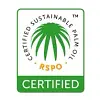
RSPO Supply Chain Certification
About (RSPO Supply Chain Certification)
The RSPO Supply Chain Certification (SCC) is an integral part of the Roundtable on Sustainable Palm Oil (RSPO) scheme, designed to ensure the traceability and integrity of sustainably produced palm oil throughout the supply chain. This certification helps organizations demonstrate their commitment to responsible sourcing and production of palm oil products.
Key Features of RSPO Supply Chain Certification
-
Supply Chain Models:
- Identity Preserved (IP): Ensures that RSPO Certified Sustainable Palm Oil (CSPO) from a single identifiable source is kept separate from non-certified palm oil throughout the supply chain.
- Segregated (SG): Allows CSPO from different certified sources to be mixed but kept separate from non-certified palm oil.
- Mass Balance (MB): Permits mixing of CSPO with non-certified palm oil, but requires that the volume of certified product entering the supply chain is controlled and matched with the volume leaving it.
- RSPO Credits / Book & Claim: Enables manufacturers and retailers to buy RSPO Credits from certified growers, supporting sustainable palm oil production without physical traceability.
-
Certification Process:
- Organizations must undergo an audit by an accredited certification body to verify compliance with the RSPO SCC Standard.
- The audit assesses the organization's systems for controlling RSPO-certified products, ensuring traceability and proper documentation.
-
Traceability and Transparency:
- The certification ensures that all RSPO-certified products are traceable through the supply chain, from the plantation to the final product.
- Organizations must maintain accurate records and documentation to demonstrate compliance with the certification requirements.
-
Benefits of Certification:
- Market Access: Enhances access to markets that demand sustainably produced palm oil.
- Consumer Trust: Builds consumer confidence by ensuring that products are sourced responsibly.
- Environmental Impact: Supports sustainable palm oil production, reducing deforestation and promoting biodiversity.
Conclusion
The RSPO Supply Chain Certification is essential for organizations committed to sustainable palm oil production. By adhering to this certification, companies can ensure the integrity of their supply chains, meet market demands for sustainability, and contribute to environmental conservation.